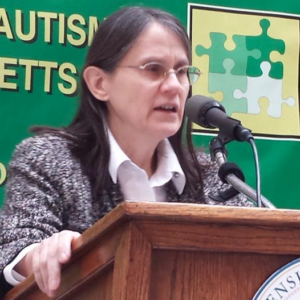
We are honored to feature the following article on accessory units by guest author, Catherine Boyle (pictured above). Boyle is the president of Autism Housing Pathways, a Massachusetts non-profit that works with families to find or create housing options for their family members with developmental disabilities. A former Foreign Service Officer, she is a member of the Winchester Housing Authority, in Winchester, Mass., and of the Winchester Housing Partnership Board. She has a 24-year-old autistic son who lives in a limited-equity housing cooperative that is also a state-licensed group home.
Putting Accessory Units in Reach for Families,
By Catherine Boyle
Accessory apartments (sometimes called in-law apartments) are one of the most affordable ways families can create independent housing. However, they are not necessarily sustainable when parents pass on, parents must charge fair market rent or the family member’s SSI benefits will be reduced, and “one of the most affordable” doesn’t mean “affordable to most.” Then, too, there is the question of paying for support services.
In Massachusetts, efforts are underway to address the two major barriers to making accessory units more viable: zoning and affordability. To address the first, Autism Housing Pathways (AHP), in collaboration with Advocates for Autism of Massachusetts (AFAM) and The Arc of Massachusetts, has proposed municipalities consider adopting a model zoning bylaw, which would permit accessory apartments for elderly or disabled relatives of the homeowner as a “by right use”. By Right Use (also called Use by Right) refers to a property owner’s use of property and structures in manners consistent with that which is permissible in the zoning district that the property is located. A ‘by right use’ is a use permitted in a zoning district and therefore not subject to special review and approval by local government. The by-law has been presented to several planning boards, and will hopefully be on the Town Meeting docket in at least one municipality this fall.
The second effort is a bill in the legislature, S. 2202, which would allow homeowners to take out a loan from the state to create an accessory unit of up to two bedrooms, provided a person who is either elderly or disabled resides in either the accessory or primary unit. The loan, which potentially has deferred payments and 0% interest, can be for up to 50% of construction costs or $50,000, whichever is less. An additional feature is that, while the home must be owner-occupied, a special needs trust counts as an owner-occupier if the beneficiary lives there. Units must be at least 450 square feet.
Massachusetts has a Medicaid State Plan service that pays a stipend to either family member who is not a legal guardian (Adult Family Care) or non-family member (Adult Foster Care) to provide live-in care.
This makes the following scenario possible:
- The individual with a disability signs up for Sec. 8 (preferably at age 18)
- A family member becomes the Adult Family Care provider, and receives a stipend of about $9,000/year.
- The family member saves the Adult Family Care stipend in a separate account.
- In approximately 10 years, the individual receives a Sec. 8 voucher and the family has saved $90,000.
- The family member takes a loan from the state for $50,000; the family now has $140,000 to devote to creating an accessory apartment.
- Construction costs in greater Boston range from $150-$200/sq. foot. At the lower end, a 900 sq. foot accessory apartment would cost $135,000, and costs are completely covered by savings and the loan. At the higher end, the family might need to take out a home equity loan for $40,000. A smaller unit would obviously cost less, and could completely avoid the need for a home equity loan.
- The Sec. 8 voucher can cover the cost to pay for the home equity loan.
Under this scenario, the individual can move into the apartment with an Adult Foster Care provider, and the family can provide respite. Later, the family can transfer ownership of the home to a special needs trust. This ensures the individual can continue to live there, while the parents potentially avoid a look-back period if they need to qualify for Medicaid for their own support needs. (Please note, nothing in this blog constitutes financial, legal, or real estate advice.)
Families do need to be aware they will need permission from the housing authority issuing the Section 8 voucher to be the Section 8 landlord for a family member. Although typically not permitted, it is often allowed as a reasonable accommodation for a person with a disability.
S. 2202 has been passed by the Joint Committee on Housing in the 2015-2016 session, and, as of July 1st 2016, is before the Senate Ways and Means Committee. A very similar bill, A08696, is in a third reading in the NY State Assembly. Accessory apartment loan bills are a viable approach to increasing housing options, and advocates should consider approaching their legislators to advance such legislation.

 Person-Centered Planning: What is it, and why does it matter?
Person-Centered Planning: What is it, and why does it matter?


